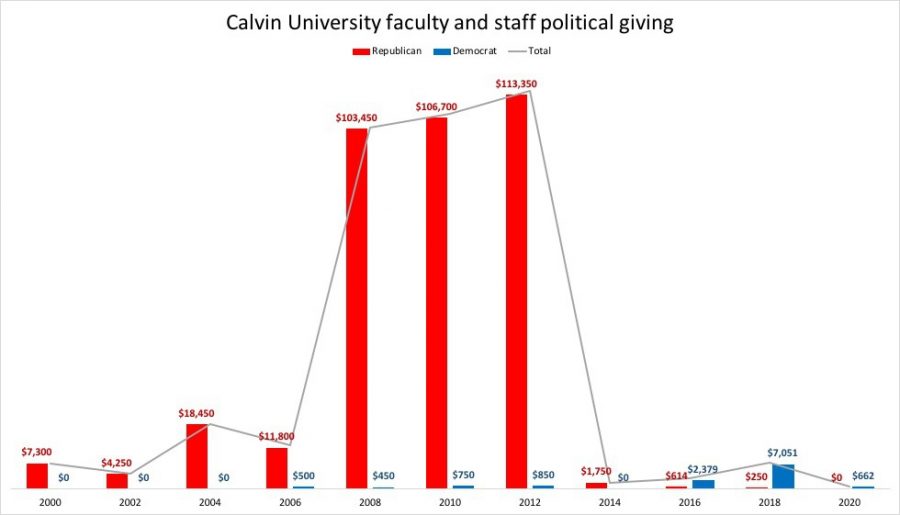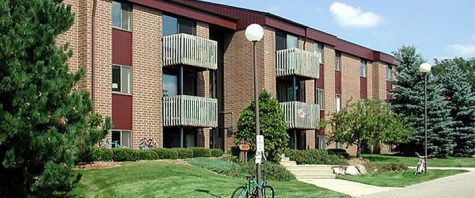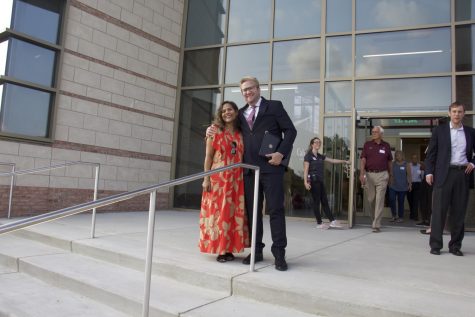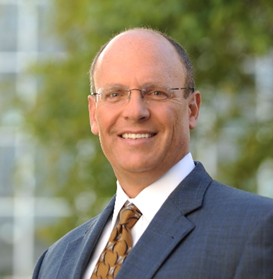Calvin employees’ political donations far less than past years, below peers’ giving
Calvin political donations see a rise in Democratic giving after a spike of Republican giving.
As of Oct. 14 according to opensecrets.org, so far in the 2020 election cycle, Calvin’s individual employees or their immediate family have donated $662 to federal candidates and political parties. OpenSecrets is a research group that tracks money in U.S. politics. These donations didn’t come from Calvin itself but from individuals at Calvin or their immediate family members. Of that money, $562 has been donated to individual candidates and $100 to political parties.
Donation rates have dropped in the past few years. In 2008, 2010 and 2012, Calvin individuals’ donations totaled over $100,000 each year. Since 2014, donations have not risen above $8,000, with $7,403 in 2018. Political science professor Doug Koopman thinks most of that money came from former Calvin President Byker who was “heavily involved” in the Republican party. Koopman said, “Probably most of those Republican contributions were his.”
Thus far, all the money donated has been given to either Democrats or the Democratic party. This is a shift from Calvin’s previous donations, which were 99% or above to Republicans from 1990-2014. Koopman attributes this to Byker, saying, “He was a major donor to the Republican party for many many years, maybe still is.”
According to OpenSecrets, the candidate with the highest amount of donations from Calvin individuals is Pete Buttigieg with $184. Following Buttigieg is Seth Moulton (who has withdrawn from the race) at $100 and Bernie Sanders at $90.
Koopman says Calvin’s faculty involvement in national politics is “pretty low.” He went on to say, “There just aren’t that many people ever who work at Calvin that have given to politics.”
Koopman’s explanation for this is Calvin’s high number of Christian Reformed faculty members. The CRC spans North America, not only the U.S., so members often put their efforts towards organizations rather than candidates. He expands on this idea by saying, “When people want to get involved in policies, they tend to get active or contribute to things like global climate change or global hunger or refugees, things like that, but not political parties in the United States.”
In comparison, so far in this election cycle individuals and immediate family have given $8,405 at Grand Valley University and $29,877 at Western Michigan University
Koopman didn’t think being a Calvin employee was a significant factor in donation. He said the Federal Collections Committee requires a donor’s place of employment because it tracks political schemes.
An anonymous Calvin employee who had never previously donated spoke about donations they made this year, saying, “I just feel really strongly about the upcoming elections. I need to find a way to be engaged and contribute something to the process, even if I can’t totally control the outcome.”
Senior Caroline Lampen has interned in political campaigns since the 2016 election cycle. She is inclined to think Calvin’s student involvement in national politics is minimal, and students should be more involved. She has donated to political candidates and plans to continue to do so in the future. When it comes to student involvement in politics, she says, “I think we all have a responsibility to be involved at some level.” For students, according to Lampen, this means “at the minimum, paying attention to current events and voting.”









Karen Saupe • Oct 24, 2019 at 4:59 pm
Interesting story! I’d be curious to see data (if available) about how many individuals contributed–that might speak more accurately to level of involvement than the total amount of money. As Koopman’s comments suggest, one wealthy contributor might well offset hundreds of others who can’t play in the same financial league.
Natsun Eisen '14 • Oct 18, 2019 at 11:30 am
Great article. I would have appreciated a few more quotes from different people, but as it is, this provides a unique insight into Calvin as an institution.